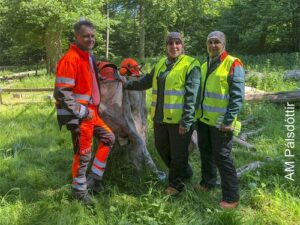A study is underway to evaluate the use of nature and nature-based activities to help integrate migrants in Sweden and promote good health. Researchers from the Swedish University of Agricultural Sciences and Forest Research are using qualitative and quantitative methods to evaluate a Nature Integration Programme that began in December 2015 – and so far the preliminary results are promising.
In recent years, Sweden has taken in large numbers of refugees, asylum seekers, migrants and immigrants. The Nature Integration Programme was created to facilitate sustainable integration of these groups into society.

Currently running in Scania County in southern Sweden, the project comprises a year-long vocational trainee programme for migrants and a two-year programme for long-term Swedish unemployed, with both groups working together.
The initiative is the result of a partnership between The Swedish Public Employment Service (SPES), the Swedish Forestry Agency (SFA) and the Swedish Nature Conservation Unit (SNCU), and is being developed and improved as it progresses.
The programme addresses vocational and language skills (for migrants), social networking, and promotes physical activities through nature-based vocational training, including courses in brush cutting and chain saw use. The nature conservation work includes building and maintaining walking paths, clearing out meadows, building staircases, fences and information boards, and cutting down trees and bushes.
The study uses questionnaires in the trainees’ own languages to examine their perceived general health, physical activity, sleep quality, self-efficacy and nature connectedness. Gathering data from vulnerable groups is challenging, however, and there has been a drop-off in responses at follow-up points. The researchers also undertook field visits and interviewed trainees and group leaders.
In 2017–18 there were 53 responses from migrant participants. While research is ongoing, initial responses from this first cohort shows that over 90% of migrants reported positive responses to nature connections. The proportion of migrants reporting a range of sleep disturbances also fell significantly.
While the work at the nature reservation sites is labour-intensive and physically demanding, it is perceived as meaningful work. Migrants are introducing their families to the places they have been working, showing pride in their nature conservation achievements. As a result, the programme is aiding the integration of different cultures, as migrants get to know the countryside beyond the city and Swedes learn about migrants’ lives and their native countries.
This study will be completed in late 2019.
Gentin, S., Chondromatidou, A.M., Pitkänen, K., Dolling, A., Præstholm, S. and Pálsdóttir, A.M. Defining nature-based integration. Perspectives and practices from the Nordic countries. Reports of the Finnish Environment Institute, 16, 2018. http://hdl.handle.net/10138/236244
Planting woodland adjacent to established woodland or in large clumps is more likely to boost bird populations than random planting, modelling suggests.

Forest Research has announced that Dr Bianca Ambrose-Oji, currently Head of its Society and Environment Research Group, will succeed Professor Chris Quine FRSE as Chief Scientist from June 2025.
England’s non-woodland trees have been mapped for the first time, revealing these trees make up nearly one third of our nation’s tree cover.
Planting woodland adjacent to established woodland or in large clumps is more likely to boost bird populations than random planting, modelling suggests.

Forest Research has announced that Dr Bianca Ambrose-Oji, currently Head of its Society and Environment Research Group, will succeed Professor Chris Quine FRSE as Chief Scientist from June 2025.
England’s non-woodland trees have been mapped for the first time, revealing these trees make up nearly one third of our nation’s tree cover.